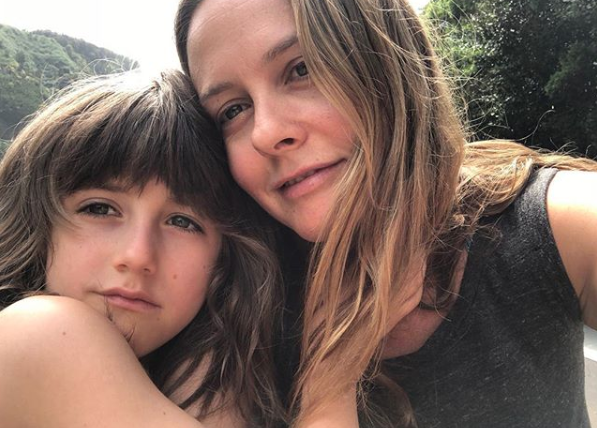Alicia Silverstone's kid has 'never' taken medicine because of his vegan diet. But is veganism safe for kids?

Actress Alicia Silverstone credits her seven-year-old son’s good health to veganism.
The “Clueless” star, 42, who raises Bear Blu with her ex-husband, Christopher Jarecki, has been a vegan herself for more than two decades. She’s an environmental and vegan activist, and wrote the 2011 best-selling cookbook The Kind Diet: A Simple Guide to Feeling Great, Losing Weight, and Saving the Planet.
In a recent appearance at Good Housekeeping’s #RaiseTheGreenBar sustainability summit in New York City, Silverstone said her son is healthy because he doesn’t consume meat, dairy, or other foods that come from animals.
“He’s never had to take medicine in his life,” she said. “He can get sniffles and a runny nose but he’s not down, he still goes to school. Two times in his life has he been like ‘Mommy I don’t feel good,’ and it was only for a few hours and he was back running around.”
Being vegan means not eating anything that comes from an animal, including meat, poultry, fish, seafood, dairy, eggs, honey, and gelatin (which is found in marshmallows, Jell-O, some puddings and candy, certain commercially prepared sauces, and other products and is made from animal skin, bones, and tendons).
Arguments against veganism in kids centre on the notion that the diet is low in essential nutrients such as vitamin B12, iron, zinc and calcium that are found in abundance in certain animal products. There’s a school of thought that a vegan diet in childhood isn’t safe, thanks in part to rare but sensational stories of malnourished children being hospitalized after being fed a vegan diet.
ALSO SEE: Alicia Silverstone says her 7-year-old son has ‘never’ taken medicine thanks to being vegan
However, when properly done, a vegan diet can be safe and healthy for kids.
According to the Canadian Pediatric Society, “well-planned vegan diets with appropriate attention to specific nutrient components can provide a healthy alternative lifestyle at all stages of fetal, infant, child and adolescent growth.”
Dietitians of Canada, meanwhile, states that a vegan diet can be consumed at all life stages, from childhood to older adult. The organization points out that a well-planned vegan diet is high in fibre, vitamins and antioxidants while being low in saturated fat and cholesterol.
Registered dietitian Pamela Fergusson, who’s based in B.C. and specializes in plant-based nutrition, says that it is necessary for vegans to supplement with vitamin B12. However, she vegans can get everything else they need from plant-based sources.
Bear and I on our Hawaiian adventure. My sweet sweet love 💕
A post shared by Alicia Silverstone (@aliciasilverstone) on Feb 25, 2018 at 5:09pm PST
“All plants have some protein and beans, lentils, soy, and whole grains are very good sources,” Fergusson tells Yahoo Canada. “Calcium can be found in tofu, nuts, seeds, beans, and greens, so you don’t need dairy. Plant-based milks are also fortified with calcium to the same level as dairy milk.
“A vegan diet does not need to be difficult or time-consuming,” she adds. “Find easy and family-friendly recipes like chili, curry, soups, stews, pasta, and stir fries that use whole food ingredients. Be sure to include lots of fruits, veggies, beans, lentils, nuts, seeds, and whole grains.”
ALSO SEE: What to do when your kid decides to be a vegan
Anna Pippus, a Vancouver animal-rights lawyer and activist who blogs about the vegan lifestyle, is raising her two kids as vegans. She gives them multivitamins and looks to evidence-based guidelines from credible health organizations, such as Dietitians of Canada, for guidance on healthy eating. She says that making nutritious, kid-friendly vegan meals doesn’t need to be complicated.
“Many people, myself included, find that once we start exploring the flavourful, varied world of plant-based cuisine, our excitement and enthusiasm for learning something new keeps us going,” Pippus tells Yahoo Canada. “It doesn’t hurt that plant-based eating makes us feel good, both mentally and physically, tastes delicious, and is easy on the budget.
“Vegan eating can be as easy as we need it to be; there are vegan swaps for pretty much every meat, dairy and egg dish out there,” she adds. “Learn one new plant-based recipe—like chickpea curry, pasta e fagioli, veggie chili, noodles in peanut sauce, or crispy tofu stir-fry—and then, when that feels manageable, learn one more. Experiment with grain bowls, scrapping the meat-and-potatoes approach to the dinner plate and instead combining grains, legumes, veggies, sauce and nuts or seeds.”
She also suggests exploring vegetarian-friendly Ethiopian, Indian, Lebanese, Thai, Chinese, or Mexican restaurants for inspiration on how to prepare legumes.
“For me, the bottom line is that we can all not only be healthy, but we can thrive on plant-based diets,” Pippus says. “Knowing what we do about how destructive animal farming is for the planet, the animals, and human health, why not get our nutrients from plants?”
Let us know what you think by commenting below and tweeting @YahooStyleCA!
Follow us on Twitter and Instagram.
Check out Yahoo Canada’s podcast, Make It Reign — our hot takes on all things royals in a non-stuffy way — on Apple Podcasts and Google Podcasts.


